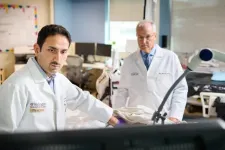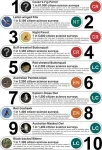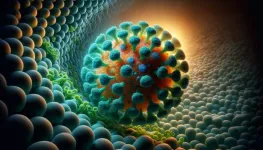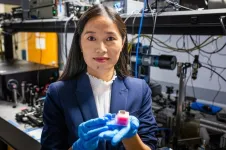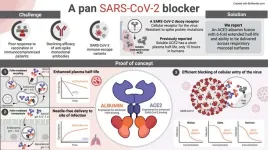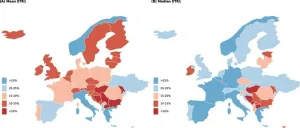(Press-News.org) Doctors managing deceased organ donors routinely treat the donors’ bodies with thyroid hormones in a bid to preserve heart function and increase the quantity and quality of hearts and other organs available for transplantation. However, according to a recent clinical trial led by researchers at Washington University School of Medicine in St. Louis and Mid-America Transplant in St. Louis, routine thyroid hormone intervention is not effective at achieving these goals, and may even cause harm.
The study is published Nov. 30 in The New England Journal of Medicine.
“There have been very few studies of what really works in terms of preserving organ function for donation — and with a shortage of donor organs for transplantation, it’s critical to do what we can to preserve organs and save lives with them,” said Raj Dhar, MD, a professor of neurology at Washington University and an attending physician in the Neurology/Neurosurgery Intensive Care Unit at Barnes-Jewish Hospital. Dhar is the corresponding author on the paper and led the clinical trial with Gary Marklin, MD, the chief medical and research officer at Mid-America Transplant, the organ-procurement organization for the St. Louis region.
“We decided to investigate whether intravenous thyroid hormone would result in more hearts transplanted,” Dhar said. “This practice has been adopted by multiple organ-procurement organizations and is used on thousands of organ donors each year, without ever having been rigorously studied. It turns out that it doesn’t have any benefit and may cause some harm. Our findings tell us we should halt this practice.”
When patients are declared dead according to neurologic criteria, their organs can be donated for transplantation with the consent of the deceased or their relatives. Deceased donors can provide up to eight organs, if all are in good shape. It can take up to 72 hours from the time of death to the time a transplant surgery begins. During that time, doctors such as Dhar and Marklin work to keep the donors’ hearts beating as normally as possible to preserve the health of the heart and other organs. But despite doctors’ best efforts, about half of all such hearts deteriorate and are not suitable for transplantation when the time comes.
Previous observational studies have suggested that giving deceased donors thyroid hormones may increase a heart’s viability. Thyroid hormones influence the force and speed of heartbeats, and levels of the hormones can fall once the brain stops working. At the same time, some doctors worry that treating donor hearts with intravenous thyroid hormones may increase the risk of fast heart rate and high blood pressure, which could injure other organs and make them less suitable for transplantation. Despite these concerns and a lack of definitive evidence in support of the practice, hormone supplementation for deceased organ donors has become standard.
“I have always been skeptical of the benefits of thyroid hormone in donor management based on its physiology and the previous published studies, which is why we did not use levothyroxine to treat our donors at Mid-America Transplant,” Marklin said. To date, Mid-America Transplant has cared for more than 2,700 deceased organ donors at their independent organ recovery center, more than any other organ-procurement organization in the nation.
“But since more than 70% of the organ-procurement organizations do use thyroid hormone, Dr. Dhar and I felt we needed to do the definitive study to answer this important question: Does giving organ donors thyroid hormone preserve heart function and make more hearts available for transplantation?” Marklin continued. “It is very unusual to have a study of deceased organ donors of this size and with such sufficient rigor, but we believed the four-year, multicenter research was critical to definitively answer this key question to enable better organ donor management.”
Dhar and Marklin pulled together a team across 15 organ-procurement organizations nationwide, including Mid-America Transplant. With authorization for research provided by their families, 838 organ donors who had been declared dead according to neurological criteria were enrolled. Half were randomly selected to receive levothyroxine within the first 24 hours while the others were given saline. Levothyroxine is a synthetic form of the human thyroid hormone T4, commonly used to treat hypothyroidism. The study was not blinded so that organ recipients could be fully informed about the hearts they were about to receive. Each organ-procurement organization followed its own standard donor care and organ allocation protocols for all donors enrolled in the study.
Thyroid hormone treatment made no significant difference in the number of hearts successfully transplanted. Just over half of the hearts from each group were suitable for transplantation: 230 (54.9%) from the thyroid hormone group and 223 (53.2%) from the placebo group. Of the 453 hearts transplanted, 97.4% of the hearts from thyroid hormone-treated donors and 95.5% of hearts from placebo-treated donors still worked well for the recipients after 30 days. This small difference was not statistically significant.
Further, thyroid hormone was more likely to cause hypertension and fast heart rate before donation. These adverse effects became less severe or disappeared when the doses of hormones were reduced or discontinued in the thyroid hormone group, indicating that the hormone may cause temporary overstimulation of the heart in addition to having little to no effect on heart transplant efficiency.
“We found good evidence that this intervention we’ve been using for 40 years doesn’t work,” Dhar said. “It’s vital that we explore questions like this to ensure we are doing all we can for patients who need organs — and to ensure that they receive the most benefit possible from the generous people who choose to donate organs.”
After seeing the results, several organ-procurement organizations have stopped using thyroid hormone in treatment of organ donors, Dhar said.
END
Long-standing hormone treatment for donated hearts found to be ineffective
Practice of using thyroid hormones to preserve function for transplantation may even cause harm
2023-11-29
ELSE PRESS RELEASES FROM THIS DATE:
Catalysts of change: Young scientists spearhead breakthrough COVID-19 research in international collaboration
2023-11-29
A recent groundbreaking study, published in Nature Nanotechnology, sheds new light on the coronavirus's behavior, particularly its ability to remain attached under various mechanical stresses and the implications for person-to-person transmission. The paper, titled “Single-molecule force stability of the SARS-CoV-2–ACE2 interface in variants-of-concern,” is the result of a collaborative effort led by scientists from Auburn University, Ludwig Maximilian University of Munich, and Utrecht University. This research offers an unprecedented molecular-level understanding of the virus and raises ...
With some forms of TBI, non-deployed vets have higher risk of epilepsy than deployed
2023-11-29
EMBARGOED FOR RELEASE UNTIL 4 P.M. ET, WEDNESDAY, NOVEMBER 29, 2023
MINNEAPOLIS – A study of post-9/11 veterans shows that those with moderate or severe traumatic brain injury (TBI) who have never been deployed have a higher risk of epilepsy than those who have been deployed. The study is published in the November 29, 2023, online issue of Neurology®, the medical journal of the American Academy of Neurology.
“We anticipated that deployment would be linked to a higher risk of epilepsy among post-9/11 veterans with TBI given the potential higher risk for a blast or combat ...
Certain migraine medications may be more effective than Ibuprofen
2023-11-29
EMBARGOED FOR RELEASE UNTIL 4 P.M. ET, WEDNESDAY, NOVEMBER 29, 2023
MINNEAPOLIS – For many people with migraine, it can be difficult to find a treatment that is effective and reliable, and information on how medications compare to one another is lacking. A new study draws data from nearly 300,000 people using a smartphone app to help people make decisions about their medications. The study found that certain migraine medications like triptans, ergots and anti-emetics may be two to five times more effective than ibuprofen ...
Embedding fibers to undo the tapestry of memory loss in Alzheimer's disease
2023-11-29
Every 65 seconds, someone in the United States develops Alzheimer’s disease, a devastating form of dementia that affects 6.2 million Americans.
Though it was initially identified almost 120 years ago, Alzheimer’s disease is a progressive neurological disorder with no cure and few treatments. It starts out with minor memory loss that, over time, advances to a mental decline so severe, individuals have difficulty even swallowing.
Xiaoting Jia, associate professor in the Bradley Department of Electrical ...
Novel study finds aspirin-free regimen benefits patients with LVAD
2023-11-29
The ARIES-HM3 Randomized Clinical Trial assessed the safety and efficacy of excluding aspirin from the antithrombotic regimen in patients with advanced heart failure who have undergone implantation of a fully magnetically levitated left ventricular assist device (LVAD).
“We can now safely say that not giving aspirin is not only safe from a thromboembolic risk profile but results in improved adverse event rate by a significant reduction in non-surgical bleeding which is a well-known complication related to LVAD therapy,” said Mirnela Byku, M.D., Ph.D., MBA, co-author of the study and director of the UNC Durable Mechanical ...
Your local sea snail might not make it in warmer oceans – but oysters will
2023-11-29
The frilled dog winkle may sound like a complex knot for a tie, but this local sea snail holds clues to our warmer future, including a dire outlook for species that can’t move, adapt, or acclimate as fast as their environment heats up.
Strait of Georgia hotspot
To figure out how location affects vulnerability to a changing climate, UBC zoology researchers Drs. Fiona Beaty and Chris Harley collected marine snails from the Strait of Georgia, a potential hot spot of climate risk, and the Central Coast, where waters are cooler and warming more slowly.
They monitored snails ...
600 years of tree rings reveal climate risks in California
2023-11-29
The San Joaquin Valley in California has experienced vast variability in climate extremes, with droughts and floods that were more severe and lasted longer than what has been seen in the modern record, according to a new study of 600 years of tree rings from the valley.
The researchers used the tree rings to reconstruct plausible daily records of weather and streamflow scenarios during the 600-year period.
This new approach, combining paleo information with synthetic weather generation, may help policymakers and scientists better understand – and anticipate ...
Big cities foster socioeconomic segregation; Here’s how we can fix that
2023-11-29
We tend to think of large cities as melting pots – places where people from all sorts of backgrounds can mingle and interact. But according to new research, people in big cities tend to primarily interact with other individuals in the same socioeconomic bracket, whereas people in small cities and rural areas are much more likely to have diverse interactions.
Using cellphone data, a collaboration of researchers led by Stanford University determined that most people in big cities have very few opportunities for even brief interactions with those outside their own socioeconomic status. ...
A long-acting biologic with transmucosal transport properties that arrest SARS-CoV-2 virus variants
2023-11-29
When the COVID-19 pandemic first started, no effective anti-viral drugs were available to fight the disease. However, in record time, so-called monoclonal antibodies were developed as a lifesaving treatment. Now, 3 years later, none of the approved antibodies work effectively against the new SARS-CoV-2 virus variants due to mutations that alter their spike protein.
While vaccines protect against severe disease, there is still an urgent need for effective virus-blocking agents for therapeutic or prophylactic use. This is particularly relevant for patients ...
Study reveals the real tax rate paid by multinational corporations in 47 countries
2023-11-29
Despite a similar statutory tax rate for multinational corporations (MNCs) across many countries, the effective tax rate that MNCs actually pay differs greatly — as low as 1% of gross income in Luxembourg and as high as 67% in Norway. That’s one conclusion of a study published this week in the open-access journal PLOS ONE by Javier Garcia-Bernardo of Utrecht University, the Netherlands, Petr Janský of Charles University, Czechia, and Thomas Tørsløv of Danmarks Nationalbank, Denmark. The study comes on the ...
LAST 30 PRESS RELEASES:
Personal perception of body movement changes when using robotic prosthetics
Study shows brain responses to wildlife images can forecast online engagement — and could help conservation messaging
Extreme heat and drought at flowering could put future wheat harvests at risk
Harlequin ichthyosis: a comprehensive review of pathogenesis, diagnosis, and management
Smithsonian planetary scientists discover recent tectonic activity on the Moon
Government censorship of Chinese chatbots
Incorporating a robotic leg into one’s body image
Brain imaging reveals how wildlife photos open donor wallets
Wiley to expand Advanced Portfolio
Invisible battery parts finally seen with pioneering technique
Tropical forests generate rainfall worth billions, study finds
A yeast enzyme helps human cells overcome mitochondrial defects
Bacteria frozen in ancient underground ice cave found to be resistant against 10 modern antibiotics
Rhododendron-derived drugs now made by bacteria
Admissions for child maltreatment decreased during first phase of COVID-19 pandemic, but ICU admissions increased later
Power in motion: transforming energy harvesting with gyroscopes
Ketamine high NOT related to treatment success for people with alcohol problems, study finds
1 in 6 Medicare beneficiaries depend on telehealth for key medical care
Maps can encourage home radon testing in the right settings
Exploring the link between hearing loss and cognitive decline
Machine learning tool can predict serious transplant complications months earlier
Prevalence of over-the-counter and prescription medication use in the US
US child mental health care need, unmet needs, and difficulty accessing services
Incidental rotator cuff abnormalities on magnetic resonance imaging
Sensing local fibers in pancreatic tumors, cancer cells ‘choose’ to either grow or tolerate treatment
Barriers to mental health care leave many children behind, new data cautions
Cancer and inflammation: immunologic interplay, translational advances, and clinical strategies
Bioactive polyphenolic compounds and in vitro anti-degenerative property-based pharmacological propensities of some promising germplasms of Amaranthus hypochondriacus L.
AI-powered companionship: PolyU interfaculty scholar harnesses music and empathetic speech in robots to combat loneliness
Antarctica sits above Earth’s strongest “gravity hole.” Now we know how it got that way
[Press-News.org] Long-standing hormone treatment for donated hearts found to be ineffectivePractice of using thyroid hormones to preserve function for transplantation may even cause harm
